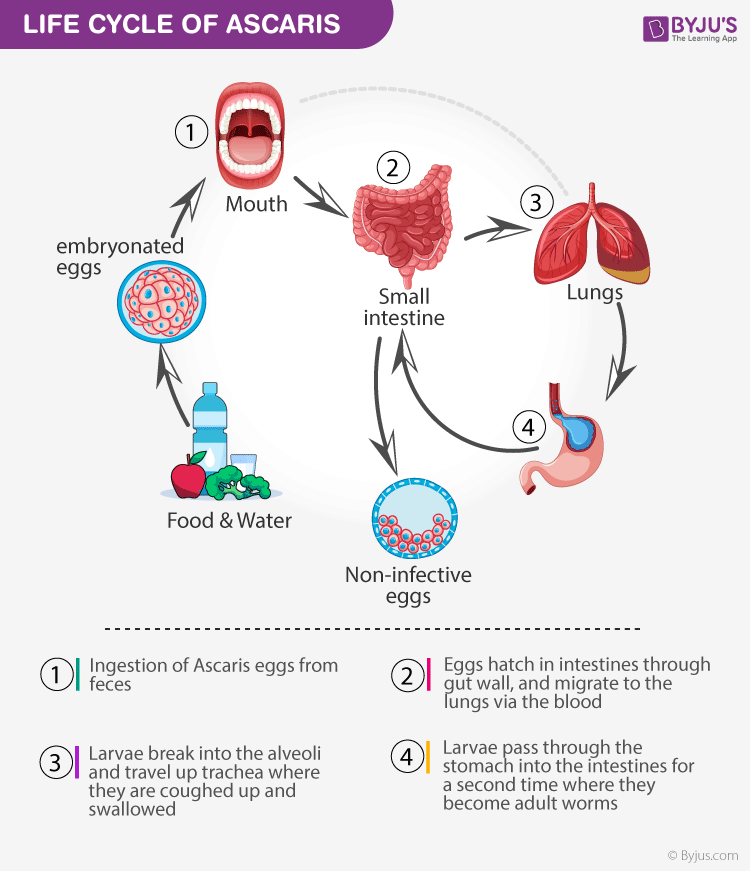
Ascarids are parasitic nematodes (worms) belonging to the genus Ascaris. These worms usually cause human ascaridosis, the occurrence of which is usually associated with poor hygiene and contamination of food or water with worm eggs. Depending on the species, roundworms can reach a length of 15 to 35 cm, making them one of the largest nematodes that can live in the human body. Ascariasis is one of the most common parasitic diseases worldwide, especially in developing countries where hygiene conditions are poor.
Ascariasis is transmitted through contaminated food and water. People can ingest ascaris eggs that remain on unwashed hands, raw food or drink, or contaminated soil. The eggs enter the intestine and there develop into larvae.
During their life cycle, ascarids first develop in the intestine, then migrate through the liver and lungs, where they can cause pneumonia or other complications. After that, they return to the intestines, where they develop into adult worms that can live in the human body for more than a year.
Since ascarids are transmitted through contaminated food and water, the prevalence of the disease is related to sanitation conditions, as well as to the region of the world, as they are more common in countries with lower levels of sanitation. Ascariasis can be dangerous, especially in children, as it can cause growth retardation, nutritional problems and other health problems.
What are the causes of ascariasis?
Roundworms (Ascaris lumbricoides) are nematodes (worms) that cause ascariasis, the most common human worm infection in the world. Ascariasis is particularly common in developing countries where there is poor sanitation, little access to clean water and insufficient access to clean food.
A person can become infected with ascarides in the following ways:
1. Consumption of unwashed hands and unwashed food. Ascariasis is transmitted through contaminated food and water. When people ingest ascarid eggs left on unwashed hands or raw food, they enter the intestines and develop into worms.
2. Insufficient hygiene. This parasitic infection often occurs where hygiene is poor, especially in rural areas where people use outdoor latrines or the soil may be contaminated with human feces.
3. Dirty water. Ascaris eggs can live in dirty water sources. People who use these sources for drinking, cooking or bathing are at risk.
4. Relations with contaminated land. Ascaris eggs can be ingested by farmers, gardeners or children who play on contaminated soil.
5. The cycle of infection. Ascariasis can persist in the intestine and multiply, causing persistent infection if untreated.
:max_bytes(150000):strip_icc()/natural-remedies-for-intestinal-parasites-88232_final-5f832e4c095c472da4e361c92ed2ff40.png)
Causes symptoms
Ascaris infection can often be asymptomatic. This is due to the fact that worms can live in the human body and reproduce without any obvious symptoms. However, some people may experience certain symptoms caused by roundworms.
These symptoms may include:
- Dyspeptic symptoms: Depending on the degree of infection, a person may experience gastrointestinal disturbances such as diarrhea, constipation, abdominal pain, bloating, or loss of appetite.
- General health: More severe infections can cause general malaise, weakness, fatigue and weight loss.
- Coughing and difficulty breathing: Eggs can travel from the intestines to the lungs through the bloodstream. This can cause a cough, sometimes with pink sputum, difficulty breathing and chest pain. This phenomenon, called Löffler's syndrome, is more characteristic of the early period of infection.
- Skin lesions: In some cases, skin rashes, itching, urticaria may occur.
- Other symptoms: Very high concentrations of ascarids can cause serious complications such as intestinal constipation or obstruction, inflammation of the pancreas and hepatitis.
If you experience any of these symptoms, you should see your doctor. Ascariasis is diagnosed through a stool test for ascarid eggs.
Ascarides for children and adults
This parasitic infection is one of the most common in the world, mostly affecting children, especially those living in underdeveloped or impoverished countries with poor sanitation. However, this does not mean that adults are not vulnerable.
For children:
Children are particularly vulnerable to ascaris infection because they often play on ground that may contain ascaris eggs. Infection usually occurs by ingesting eggs on contaminated hands, food or water. The infection can cause abdominal pain, diarrhea, loss of appetite, weight loss, and chronic fatigue. In addition, severe infections can lead to serious complications, such as intestinal constipation or obstruction.
For adults:
Although adults may be less vulnerable than children, they can still become infected with ascariasis, especially if their immune systems are weak. Symptoms in adults can be similar to those in children, including abdominal pain, diarrhea, loss of appetite, and weight loss. Respiratory symptoms such as coughing and difficulty breathing may also occur if the worms enter the lungs.

Possible complications
Ascariasis can cause a number of complications, most of which are due to the migration of the parasites through the human body or due to the large number of parasites.
One of the most serious complications of ascariasis is intestinal obstruction, which usually occurs in children. This complication can cause severe abdominal pain, vomiting, constipation or diarrhea. Bowel obstruction may require surgical treatment.
Another potential complication is a perforated bowel wall, which may also require surgical treatment. This happens when the worms press against the wall of the intestine, causing inflammation and eventually leading to perforation.
The migration of parasites through the body can also cause respiratory complications. The worms can enter the lungs during migration and cause pneumonia or Löffler syndrome, which is characterized by fever, cough and breathing problems.
The brain and other parts of the central nervous system can also be affected. Although this is rare, when it does occur, it can cause serious symptoms such as headaches, impaired consciousness, seizures, and other neurological symptoms.
How to protect yourself from ascariasis infection?
Ascarids are widespread parasites whose vectors are humans. Therefore, to reduce the risk of ascarid infection, it is very important to follow hygiene rules and protect water and food sources from contamination.
First, you need to wash your hands. This practice is especially important before eating, after using the toilets, or after working with the soil. The entire hand should be thoroughly washed, including the fingertips and nails, using warm water and soap.
Second, raw materials and vegetables, especially those that are eaten raw, should be washed well. This includes apples, carrots, lettuce and other vegetables that can be contaminated with ascarid eggs.
Third, it is necessary to avoid the consumption of raw or impurely processed foods, especially when visiting countries where ascarids are common. Water should also be boiled or filtered before drinking if there is any doubt about its cleanliness.
Fourth, it is important to implement and maintain proper sanitary conditions. This includes waste management, sewage systems and water supply systems. These measures help to reduce the risk of soil contamination.
Finally, ascarid infections are common where there are no regular deworming programs for children. This is especially important for children, who are most vulnerable to this infection.

Sources of information:
- World Health Organization. Soil-transmitted helminth infections. (2021).
- Centers for Disease Control and Prevention. Ascariasis. (2021).
- Mayo Clinic. Ascariasis. (2020).
- National Institute of Allergy and Infectious Diseases. Ascariasis. (2019).
# askaridės
